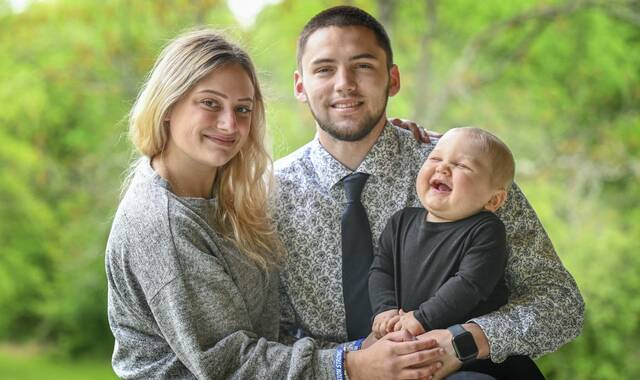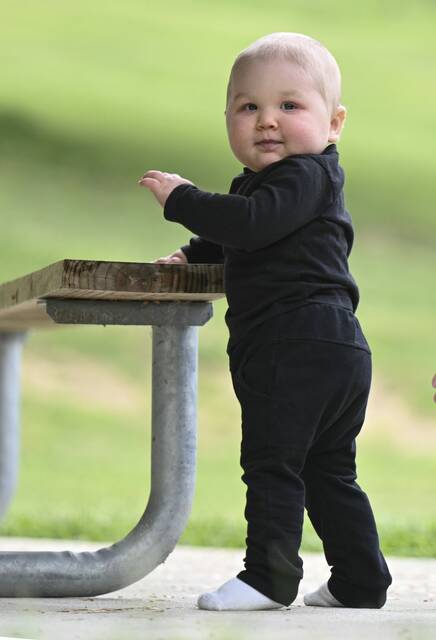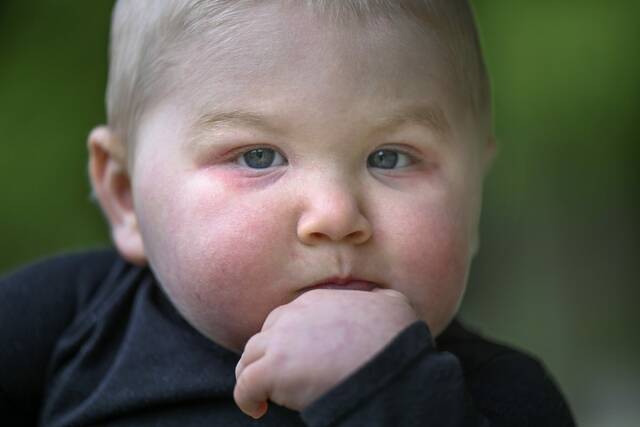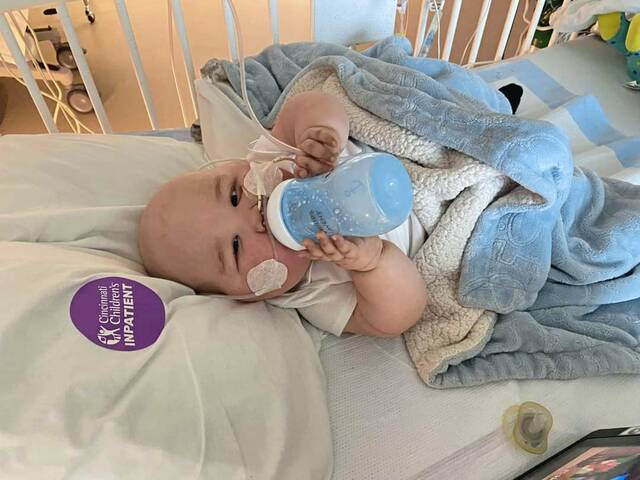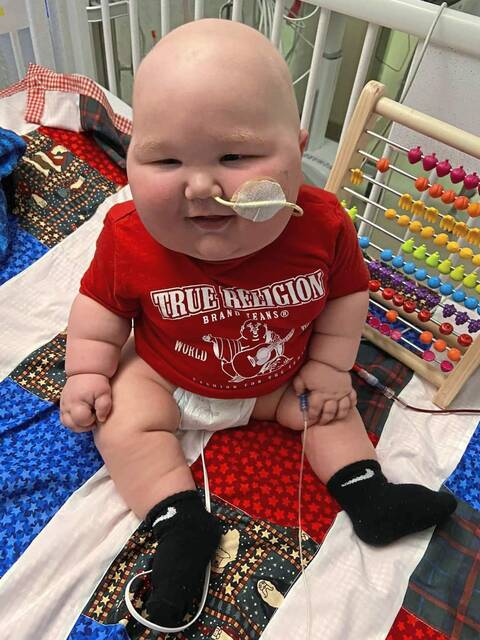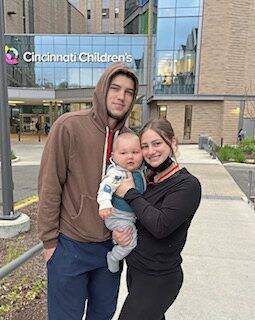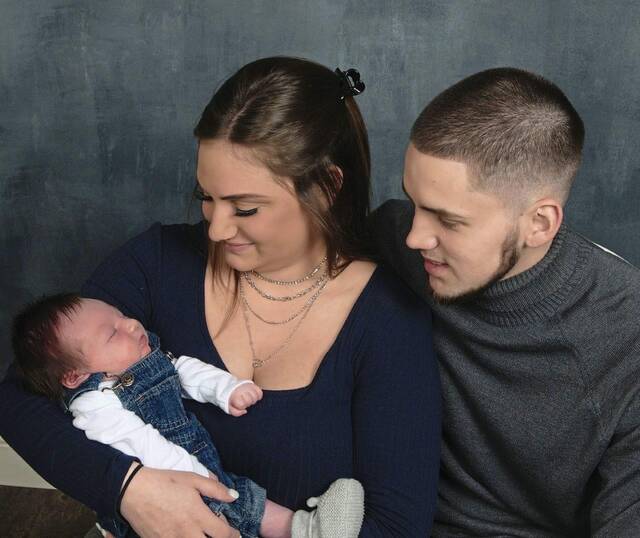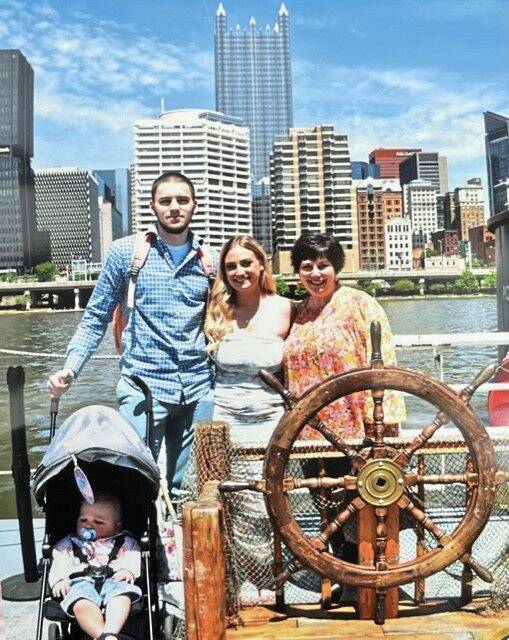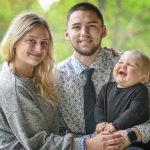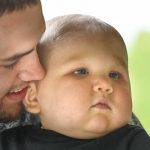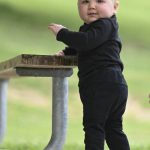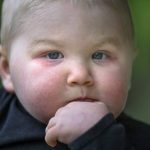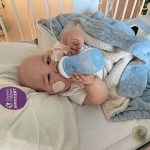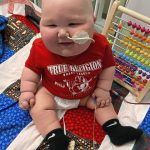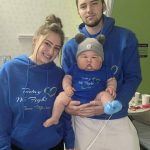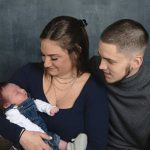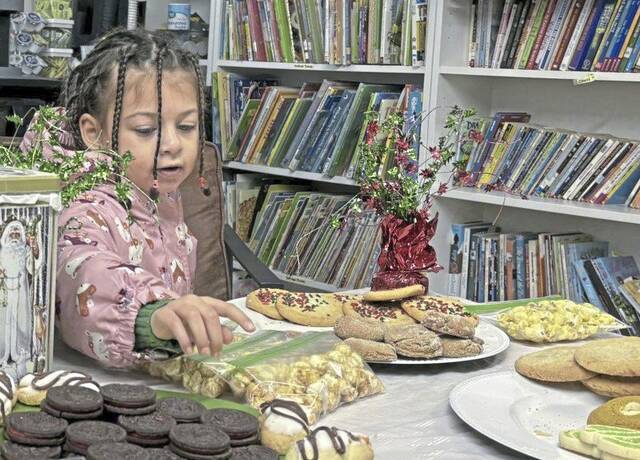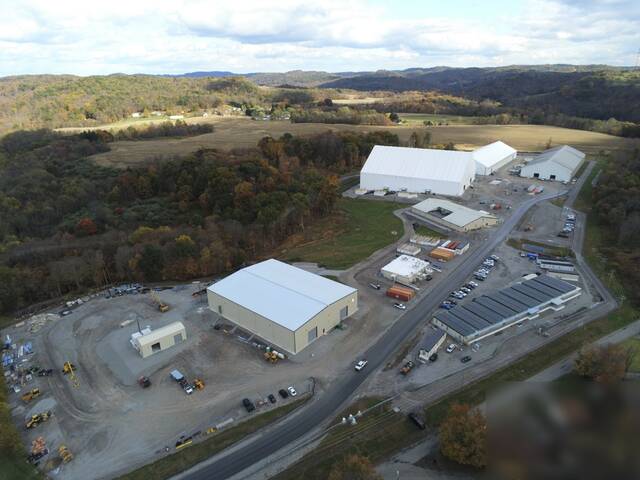Every parent knows their child is unique.
Eric and Kayla Gidel of Plum didn’t know how unique their son, Easton, was until they had to save his life.
Born on Feb. 7, 2022, Easton was diagnosed a little more than six months later with hemophagocytic lymphohistiocytosis, or HLH, an immune deficiency disorder in which part of the immune system is missing or defective, so the body can’t fight infections as it should.
Easton was diagnosed with primary HLH, one of two types of the disorder, which is caused by an inherited problem of the immune system. The other, secondary, can happen when the immune system is disturbed. Both are life-threatening.
Before he turned 1, Easton needed a bone marrow transplant. But to his parents’ shock, a genetic test found no good matches for him except for a couple of less-than-optimal ones in Brazil.
“At this point, we were terrified,” Kayla said.
Doctors at Cincinnati Children’s Hospital Medical Center, which has a center specializing in HLH, suggested a haploidentical, or haplo, transplant, using either Kayla or Eric as the bone marrow donor. Eric was the better match.
Easton had his transplant in Cincinnati in January, and the family came home to Plum in April.
“Watching my child go through all of that, it’s something no parent wants to see,” Kayla said. “I wouldn’t be the mom I am today if I hadn’t gone through that. It’s made us strong as a family. I cherish my time with him. It makes everything that much better for me.”
Kayla, 23, and Eric, 21, married in August 2021. They both had attended Holiday Park Elementary in Plum but didn’t know each other then. A Plum native, she graduated from Plum High School in 2018 while Eric, who lived in Greenfield, graduated from Central Catholic in 2019. They met through mutual friends and then online.
Kayla is one of Bill and Diane Brash’s two daughters. She became part owner of her father’s pizza shop in Plum, Grandslam Pizza, in 2018. Eric is a station manager with the U.S. Postal Service, now working in Sharpsburg.
Kayla and Eric found out they were pregnant in June 2021. Eric said becoming a father was “fantastic.”
“My dad was never in my life,” he said. “It was something that I took a little more seriously than others.”
Easton is the Brashes’ first grandchild.
“At first, it was overwhelming. We were planning a wedding and then she got pregnant,” Diane said. “Watching them, they’re so mature. Sometimes you forget how old they are.”
Kayla said the pregnancy was uncomplicated. Eric said when Easton was born, he had shoulder dystocia, which happens when one of a baby’s shoulders gets stuck behind the pubic bone or sacrum.
“He came out unresponsive,” he said, adding that a call went out for help. “About 15 people squeezed into that small room. Within a few minutes, we heard his cry.”
Easton was fine for three months. His first fever came in May. That one and a second ended after a few days.
Diane, who taught infants for 10 years at the Children’s Center of Pittsburgh, found it strange that Easton never had a runny nose.
“After the second (fever), I thought maybe he was just going around too many people or was out too often around too many germs,” she said. “I didn’t think too much into it at the time until that third one.”
When the third fever came in July and didn’t break in three days, they took Easton to the emergency room at UPMC Children’s Hospital in Pittsburgh, where Kayla said he was found to have an enlarged spleen and his white blood cell count was “sky-high.”
What followed was the search for the cause and misdiagnoses — leukemia being the first.
“It was terrifying. We didn’t know what was going on,” Kayla said. “We had no answers.”
Easton was having so much blood taken for tests that Eric said Easton was almost accustomed to the process. He became frightened of doctors.
“You just become speechless thinking this is a reality,” Eric said. “To hear your child could have something that could be life-threatening is probably the hardest thing I ever had to hear, probably the hardest thing I’ll ever hear.”
HLH is considered a rare disease. It happens to one in 50,000 children. Many doctors are unfamiliar with its symptoms, which include persistent fevers and an enlarged spleen, and it often is misdiagnosed or goes undiagnosed for a time.
Doctors in Pittsburgh diagnosed Easton with HLH in August. The results of a genetic test six weeks later determined it was the genetic, or primary, form.
Kayla said she, Eric and Easton went to Cincinnati Children’s Hospital after learning it is tops in the country for treatment of the disease. With the USPS giving Eric a temporary transfer, they moved to Cincinnati and stayed at its Ronald McDonald House from November into April while Easton was there.
Because Easton is a white American male, Eric said they were told they should have plenty of solid donors to choose from.
But Easton’s situation was quite different, he said.
Kayla said doctors didn’t find the 10/10 or 9/10 match they were looking for. There were one or two 8s in Brazil. That’s when the decision was made to turn to a haplo transplant with Kayla or Eric as the donor — Kayla was a 5/10, Eric, 6/10.
Kayla said doctors preferred not to use a donor from Brazil and, “we had Eric right there.”
Eric agreed to the transplant without hesitation but, because of a thyroid condition, had to be tested to be sure his body could handle being a donor. It went well for him.
“I had some pain walking for a few days, but other than that I was fine,” he said. “It took a while to get my energy back. It was nothing traumatic.”
During much of Easton’s fight against HLH, Kayla kept family, friends and well-wishers updated on his progress through a Facebook page called “Easton Strong.”
“It was pretty hard to update everybody,” Kayla said. “It was pretty useful getting all the information out.”
Kayla said Easton is doing great now, with the impact that steroids had on his body waning. Diane said doctors told them it will take about a year for him to fully recover.
“He’s busy. He’s a toddler now,” she said. “He looks like a normal, chubby toddler with cheeks.”
Easton’s prognosis is for a normal life, as long as he has enough of his father’s cells to keep his own in check so his HLH isn’t activated. If that happens, it can be controlled with medication.
Kayla and Eric are talking about whether they’ll have another child, which would have a 1 in 4 chance of also having HLH.
“We’re still in the decision-making process,” she said. “We’d like to have another child. We definitely want one more.”
“We’re not out of the woods with Easton yet. We’ll take it as we go,” Eric said. “With Easton’s transplant process being on the better side, I’ve come to the realization that whatever is going to happen is going to happen.”
When Easton’s future was uncertain, Kayla, a self-described planner, refused to plan for days like Mother’s Day. But they did celebrate this year with a cruise on the Gateway Clipper, which was a special day for Kayla and Diane.
After celebrating Easton’s first birthday in the hospital, the family is planning on doing his second with a big Florida beach trip.
“It’s a blessing that everything went as well as it did,” Diane said. “It’s a miracle, each step that he went through, and Easton has many miracles. God has worked many miracles in his little body and his little life.”
Kayla is thankful that Easton went through this so young. She said it helps that he won’t remember. She’s not sure what they will tell him when he’s older.
“How proud I have been of him,” she said. “To see your 15-month-old fight for his life, there’s nothing I could have done. He did that all on his own.”


